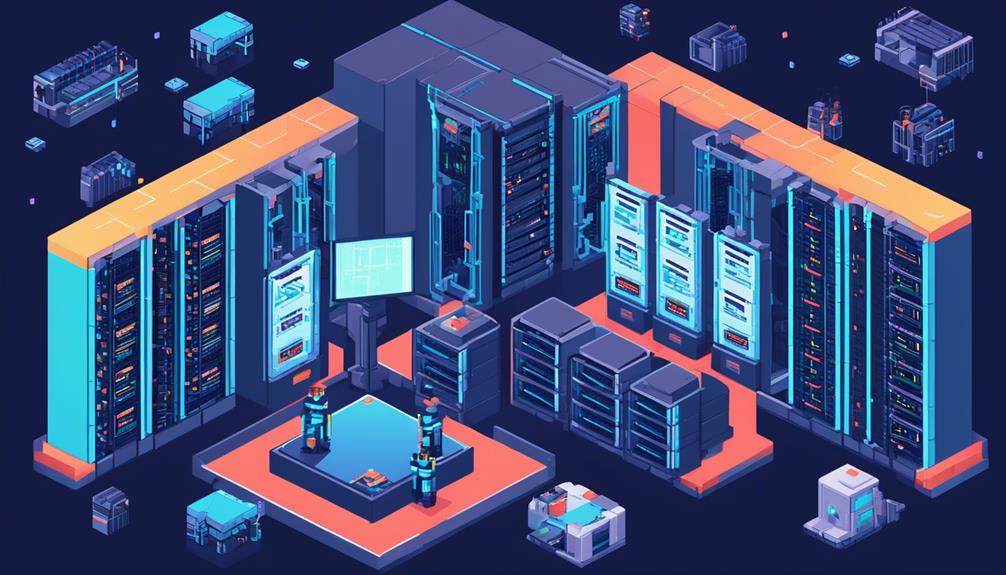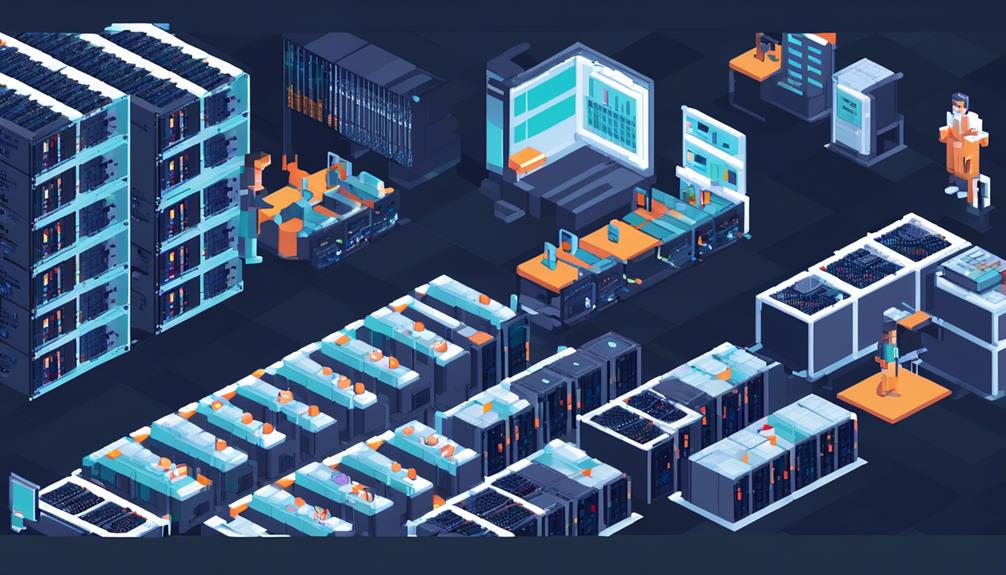Artificial Intelligence (AI) has revolutionized various industries, and its impact on data center storage solutions is no exception. With AI integration, data centers can enhance their storage infrastructure, optimize performance, and streamline operations.
The use of AI in storage management enables organizations to leverage machine learning algorithms to collect and analyze telemetry data, reducing complexity and automating manual tasks.
However, the adoption of AI in data center storage solutions also brings challenges such as vendor lock-in and data privacy concerns.
In this discussion, we will explore the benefits, innovations, and strategies associated with AI-driven storage solutions, as well as the future prospects of this rapidly evolving field.
Key Takeaways
- AI-optimized storage solutions offer enhanced performance and flexibility for data-intensive workloads.
- AI integration in storage infrastructure enables real-time data analysis and valuable insights.
- Improved storage efficiency is achieved through optimized AI development and streamlined data curation.
- Real-time data analysis provides powerful tools for immediate insights and decision-making.
Ai-Optimized Storage Solutions

Ai-Optimized Storage Solutions revolutionize data center storage by seamlessly enabling fast, connected, and resilient data platforms from edge to core to cloud. These solutions leverage artificial intelligence (AI) to transform traditional storage architectures and provide enhanced performance and flexibility for data-intensive workloads. With the exponential growth of data in today's digital landscape, AI-optimized storage solutions have become crucial for organizations to efficiently manage and analyze vast amounts of information.
One such solution is IBM Cloud Object Storage, which offers cloud-scale storage capabilities for AI, machine learning, and high-performance computing workloads. This solution utilizes all-flash and hybrid elastic compute and storage building blocks to provide the necessary performance and scalability required by these demanding applications. This allows organizations to seamlessly access and process data across their entire infrastructure, from edge devices to core data centers and cloud environments.
In addition to IBM, DDN also provides storage solutions tailored for AI workloads. Their solutions offer superior scalability, unmatched performance, and the ability to maximize insights and performance. These solutions simplify and accelerate deployment, provide intelligent monitoring, offer comprehensive insights, and ensure scalability for cost savings and future growth. By leveraging AI technologies, DDN's storage solutions enable organizations to meet the increasing demands of data-intensive AI workloads.
Furthermore, AI storage management systems play a crucial role in optimizing data center storage. These systems leverage machine learning algorithms to collect and analyze telemetry data from storage, servers, and networking systems. By automating storage resource management tasks and reducing complexity, these AI-driven solutions enhance efficiency and ensure optimal performance in data center environments.
AI Integration in Storage Infrastructure
AI integration in storage infrastructure brings numerous benefits to data centers.
Firstly, it improves storage efficiency by providing seamless access to data across different environments, allowing for faster and optimized data platforms.
Secondly, AI integration enables real-time data analysis, allowing organizations to gain valuable insights and make data-driven decisions.
Benefits of AI Integration
The integration of artificial intelligence into storage infrastructure revolutionizes data access and optimization across diverse environments, from edge to core to cloud. AI integration in storage platforms provides numerous benefits, including faster and optimized data platforms with flexible deployment options. By incorporating AI into storage infrastructure, multiple concurrent workloads can be supported on a single data platform, making it ideal for enterprise AI and analytics use cases. Additionally, AI integration reduces data silos, improves collaboration, productivity, and resource utilization, while simplifying operations. Storage solutions with AI integration offer cloud-scale storage capabilities and support high-performance computing workloads. Furthermore, they provide open-source software-defined storage solutions, enabling organizations to leverage the power of AI in their data centers.
| Benefits of AI Integration in Storage Infrastructure | ||
|---|---|---|
| Faster and optimized data platforms | Support for multiple concurrent workloads | Reduction of data silos |
| Flexible deployment options | Improved collaboration, productivity, and resource utilization | Simplified operations |
| Cloud-scale storage capabilities | Support for high-performance computing workloads | Open-source software-defined storage solutions |
Improved Storage Efficiency
Improved storage efficiency is a key advantage of integrating AI into storage infrastructure. By optimizing AI development for peak efficiency and performance, AI integration streamlines data curation, training, and inference for AI workloads.
This automation allows for faster access to data sources, storage resources, and data services, reducing the time required for model training from months to days.
Additionally, AI integration provides consistent performance and support, offering a modern shared storage architecture that scales granularly on demand for multidimensional performance.
It future-proofs AI storage by storing massive repository data sets on cost-effective all-flash storage and offering subscription services for the latest hardware and software capabilities.
This combination of optimized storage resources and AI capabilities ensures high performance and efficient data storage for AI workloads.
Real-Time Data Analysis
With the integration of AI into storage infrastructure, real-time data analysis becomes a powerful tool for immediate insights and decision-making based on the most current data. AI integration in storage infrastructure enables continuous monitoring and analysis of data, delivering real-time performance optimization and resource allocation. This ensures that critical AI workloads receive the necessary storage and compute resources in real-time through dynamic resource allocation and workload prioritization. Moreover, real-time data analysis combined with AI enhances predictive maintenance, anomaly detection, and proactive issue resolution for data center operations. It also supports real-time data-driven decision-making, enabling rapid adjustments to data management strategies and infrastructure configurations. The table below illustrates the benefits of real-time data analysis in storage infrastructure with AI integration.
| Benefits of Real-Time Data Analysis in Storage Infrastructure |
|---|
| Immediate insights for decision-making based on current data |
| Continuous monitoring and analysis for performance optimization |
| Dynamic resource allocation and workload prioritization |
| Enhanced predictive maintenance and anomaly detection |
| Real-time data-driven decision-making for rapid adjustments |
Enhancing Data Center Storage With AI
AI has revolutionized data center storage by enabling seamless access to data across diverse environments, from edge to core to cloud. AI-enhanced storage solutions offer faster, connected, optimized, and resilient data platforms, supporting multiple concurrent workloads and enterprise AI and analytics use cases.
One example of AI-driven storage solutions is IBM Cloud Object Storage, which is specifically designed for AI and high-performance computing workloads. It transforms data centers with cloud-scale storage and provides open-source, software-defined storage solutions. This allows organizations to efficiently manage and store large volumes of data, enabling faster processing and analysis for AI applications.
Another company that offers AI-enhanced storage solutions is DDN. Their storage solutions for AI provide superior scalability, unmatched performance, and the ability to maximize insights for AI workflows. With simplified deployment, intelligent monitoring, comprehensive insights, and scalability for cost savings and future growth, DDN's storage solutions are well-suited for enhancing data center storage in the AI era.
In addition to optimizing storage performance and scalability, AI is also revolutionizing storage management. AI-driven storage management leverages machine learning to collect and analyze telemetry data from hardware devices, operating systems, applications, and hypervisors. This automation reduces complexity and manual tasks associated with traditional storage resource management, allowing IT administrators to focus on more strategic initiatives.
Innovations in Ai-Driven Storage Solutions

In the realm of AI-driven storage solutions, groundbreaking innovations have emerged to revolutionize data center storage infrastructure. These innovations leverage advanced technologies to provide faster, connected, optimized, and resilient data platforms that cater to the evolving needs of modern enterprises. By consolidating file, block, and object data services on a unified storage platform, AI-driven solutions effectively reduce data silos, improve collaboration, and enhance productivity.
One of the key innovations in AI-driven storage solutions is the ability to seamlessly access data across different environments, from edge to core to cloud. This flexibility allows organizations to deploy their data storage infrastructure wherever it is most suitable, ensuring efficient data management and accessibility. Additionally, these solutions offer software-defined products that provide flexible deployment options and support multiple concurrent workloads on a single data platform.
To provide the performance required for enterprise AI and analytics use cases, AI-driven storage solutions leverage cloud-scale storage, all-flash, and hybrid elastic compute and storage building blocks. This combination of technologies enables efficient processing of AI and machine learning workloads, as well as high-performance computing tasks.
To further illustrate the innovations in AI-driven storage solutions, the table below highlights some of the key features and benefits offered by these cutting-edge technologies:
| Innovation | Description | Benefits |
|---|---|---|
| Seamless data access | Enables access to data across different environments | Flexibility, efficiency |
| Consolidation of data services | Consolidates file, block, and object data services on a unified platform | Reduced data silos, improved collaboration |
| Software-defined products | Offers flexible deployment options and supports multiple concurrent workloads | Scalability, optimized resource utilization |
| Cloud-scale storage and all-flash technology | Leverages cloud-scale storage and all-flash technology for high-performance computing | Enhanced performance, faster data processing |
Ai-Powered Data Center Storage Advancements
As data center storage continues to evolve, advancements in AI-powered technology have emerged to seamlessly integrate data access across edge, core, and cloud environments. These advancements in AI-powered data center storage solutions provide faster, connected, optimized, and resilient data platforms that support multiple concurrent workloads and enterprise AI use cases.
One example of such advancements is the consolidation of file, block, and object data services. By consolidating these services, AI-powered data center storage solutions deliver high performance, low latency, and improved collaboration. This enables organizations to efficiently manage and access their data regardless of its format.
IBM Cloud Object Storage is a notable solution in this space. It offers cloud-scale storage, specifically designed for AI, machine learning, and high-performance computing workloads. With its open-source, software-defined storage options, IBM Cloud Object Storage provides organizations with the flexibility and scalability needed to meet their evolving storage requirements.
Another significant advancement is AI storage management, which leverages machine learning to collect and analyze telemetry data. By doing so, it reduces complexity and manual tasks, enabling predictive maintenance and early attack detection. This AI-powered approach to storage management improves operational efficiency and enhances data center security.
Leveraging AI for Efficient Storage Management

Efficient storage management can be enhanced through the utilization of AI. Specifically, through the application of machine learning to collect and analyze telemetry data from storage, servers, and networking systems. By leveraging AI in data center storage solutions, organizations can achieve more effective management of their storage resources. This leads to improved performance, reduced costs, and enhanced security.
AI-driven storage management systems, often delivered as Software-as-a-Service (SaaS) applications, leverage the power of AI algorithms to perform sophisticated analysis on telemetry data collected from storage, servers, and networking devices. These systems are typically hosted on public clouds, which reduces complexity and manual tasks associated with traditional storage resource management. By analyzing the telemetry data, AI tools can provide valuable insights into the health, performance, and utilization of storage resources. This enables organizations to optimize their storage infrastructure.
To effectively leverage AI for efficient storage management, strong sets of APIs are crucial. These APIs allow AI tools to gather information from various third-party sources, such as storage arrays, servers, and networking devices. By integrating with these sources, AI-powered management systems can obtain a holistic view of the entire infrastructure and predict future events based on current usage patterns. This predictive capability enables proactive management, allowing organizations to address potential issues before they impact performance or availability.
In addition to optimizing storage resource utilization, AI in storage management also plays a crucial role in enhancing security. AI algorithms can detect anomalies in telemetry data, enabling early detection of ransomware or other cyber attacks. Furthermore, users can configure AI-powered applications to automatically take action to prevent device failures or performance degradation. This further enhances the security and reliability of the storage infrastructure.
Several vendors offer AI storage management options, each covering different storage and infrastructure solutions. Dell CloudIQ, HPE InfoSight, IBM Storage Insights, Infinidat InfiniVerse, and NetApp Active IQ are some of the prominent AI-powered storage management solutions available in the market. By leveraging these AI tools, organizations can achieve efficient storage management, optimize resource utilization, enhance security, and improve overall data center performance.
Ai-Driven Strategies for Data Center Storage
By harnessing the power of AI, organizations can implement strategic approaches for optimizing data center storage, streamlining AI development processes, automating resource management, and future-proofing their storage solutions. AI-driven strategies for data center storage solutions enable organizations to leverage AI technology to enhance storage capacity and improve overall efficiency.
| AI-Driven Strategies for Data Center Storage | |
|---|---|
| Optimization of AI Development | Implementing AI-driven storage solutions allows for the optimization of AI development processes, enabling organizations to curate, train, and infer data more efficiently. These solutions automate access to data sources, storage resources, and data services, reducing model training time and providing a consistent experience throughout the AI workflow. |
| Acceleration of AI-Driven Insights | AI storage solutions accelerate AI-driven insights by reducing turnaround times across end-to-end AI workflows. They offer a modern shared storage architecture, allowing for granular scalability and supporting any data type for AI-driven insights with consistent performance and support. This acceleration enables organizations to gain valuable insights in a shorter time frame. |
| Future-Proofing Storage Solutions | Future-proofing AI storage involves storing large repository data sets on cost-effective all-flash storage and providing subscription services for the latest hardware and software capabilities. It also includes ensuring non-disruptive upgrades and scalability to protect AI investments. These strategies ensure that storage solutions can adapt to future advancements in technology. |
Implementing AI-driven strategies for data center storage enables organizations to optimize AI development, accelerate insights, and future-proof their storage solutions. By automating resource management and leveraging AI technology, organizations can enhance storage capacity and efficiency, ultimately improving their overall data center performance.
Improving Performance With AI in Storage Solutions

Improving performance with AI in storage solutions involves leveraging AI capabilities to achieve faster storage, enhanced data retrieval, and intelligent storage optimization.
By utilizing AI algorithms, data can be processed and accessed more efficiently, resulting in reduced latency and improved response times.
Additionally, AI-driven storage management systems can optimize resource allocation, reducing waste and maximizing performance.
These advancements in AI-powered storage solutions contribute to overall enhanced data center performance and productivity.
AI for Faster Storage
AI storage management utilizes machine learning to collect and analyze telemetry data, enabling enhanced performance in storage solutions.
With the exponential growth of data, organizations are faced with the challenge of managing large amounts of data efficiently and with faster access times. Traditional storage solutions often struggle to keep up with the demands of high-performance storage, resulting in slower response times and decreased productivity.
However, AI-powered storage management systems offer a solution by leveraging machine learning algorithms to optimize storage performance. These systems can automatically analyze data patterns, identify bottlenecks, and make real-time adjustments to ensure faster access times for critical data.
Enhanced Data Retrieval
Enhanced data retrieval in storage solutions is achieved through the optimization of retrieval speed and efficiency, leveraging the power of AI.
AI in storage solutions enhances data retrieval by predicting and pre-fetching data based on usage patterns and user behaviors. By analyzing historical data access patterns, AI algorithms can anticipate future data needs and proactively fetch the required data, reducing latency and improving overall performance.
Furthermore, AI-driven predictive analytics and intelligent data tiering enable storage solutions to optimize data placement and caching strategies, ensuring that frequently accessed data is stored in faster storage tiers for quicker retrieval.
This not only accelerates data access but also optimizes resource utilization, resulting in improved performance and better user experience in data storage and retrieval systems.
Intelligent Storage Optimization
Intelligent storage optimization employs advanced algorithms and analytics to enhance the performance and efficiency of data access in storage solutions. By leveraging Artificial Intelligence (AI), organizations can streamline data access across various environments, from edge to core to cloud, improving performance and resiliency. AI-driven storage management utilizes machine learning to collect and analyze telemetry data from storage, servers, and networking systems. This allows for automated access to data sources, storage resources, and data services, reducing model training time and providing consistent performance and support. DDN's storage solutions for AI offer unmatched performance, scalability, and accelerated deployment, enabling organizations to maximize insights and efficiency in AI workflows. Future-proofing AI storage involves storing massive data sets on cost-effective all-flash storage, accelerating deployment with proven architectures, and ensuring non-disruptive upgrades and scalability.
| Benefits of Intelligent Storage Optimization | |
|---|---|
| Enhanced performance and efficiency | Streamlined data access |
| Improved resiliency | Consistent performance |
| Automated access to data sources | Reduced model training |
| Scalability and accelerated deployment | Maximum insights and efficiency |
Future of Data Center Storage: Ai-Driven Innovations

The future of data center storage is being revolutionized by AI-driven innovations, which are transforming the way organizations manage and optimize their storage infrastructure. AI is playing a crucial role in enhancing data center storage solutions by leveraging machine learning techniques to improve performance, scalability, and efficiency.
IBM Storage for AI is one such solution that provides seamless data access across edge, core, and cloud environments. It offers faster and optimized deployment options for multiple concurrent workloads and enterprise AI use cases. By utilizing AI-driven storage management, organizations can collect and analyze telemetry data from storage, servers, and networking systems. This reduces complexity, predicts future events, and enables early detection of attacks or failures.
DDN's Storage Solutions for AI, in partnership with NVIDIA, offer unmatched performance, scalability, and accelerated deployment. These solutions provide comprehensive insights and cost savings for organizations by optimizing AI support. Data centers have a pivotal role in supporting AI development, processing demands, and training and deploying complex AI models. They must also accommodate high-performance computing, GPU hardware systems, data storage, and networking requirements for AI workloads.
AI storage solutions streamline data curation, training, and inference processes. They automate access to data sources and storage resources, ensuring efficient utilization. Moreover, these solutions future-proof storage with cost-effective all-flash options, scalable architectures, and subscription services for the latest capabilities.
Frequently Asked Questions
How Is AI Used in Data Storage?
AI is utilized in data storage to enhance management and optimize performance.
AI applications in data storage include predictive analytics, anomaly detection, and automated resource allocation.
The benefits of AI in data storage include improved efficiency, reduced downtime, and proactive problem-solving.
However, implementing AI in data storage can pose challenges such as interoperability issues and data retention decisions.
Despite these challenges, the use of AI in data storage is expected to continue growing as organizations strive to leverage advanced technologies for enhanced storage management.
What Are the AI Tools for Data Storage?
AI tools for data storage encompass a range of capabilities, including AI-driven data management, AI-enabled storage optimization, and AI-powered data deduplication. These tools utilize machine learning algorithms to automate and enhance data storage operations.
One key benefit of these AI tools is their ability to efficiently utilize storage resources. By analyzing data patterns and usage, the tools can optimize storage allocation and ensure that resources are used effectively.
Another important feature of AI storage tools is their ability to identify and mitigate risks, such as ransomware attacks. By continuously monitoring data and detecting anomalies, these tools can help prevent and respond to security threats.
Additionally, AI storage tools have predictive capabilities. By analyzing usage patterns and historical data, they can predict future events and trends. This can help organizations plan and make informed decisions about their storage needs.
Leading vendors in this space, such as Dell, HPE, IBM, Infinidat, and NetApp, offer comprehensive AI storage management solutions. These solutions are designed to address the evolving needs and challenges of data storage in today's data center environments.
How Is AI Used in Data Centers?
AI is revolutionizing data center management by enabling advanced capabilities in optimization and predictive maintenance.
AI applications in data center management leverage machine learning algorithms to analyze telemetry data and automate tasks, leading to enhanced efficiency and reduced manual intervention.
AI-driven optimization techniques optimize resource allocation, improving performance and scalability.
Furthermore, AI-powered predictive maintenance enables early detection of potential issues, minimizing downtime and maximizing availability.
These advancements in AI are transforming data centers into highly efficient and reliable infrastructure for storing and managing vast amounts of data.
How Artificial Intelligence Is Used in Data Warehouse?
Artificial intelligence (AI) plays a crucial role in optimizing data warehousing processes. By leveraging machine learning algorithms, AI can analyze large volumes of data, identify patterns, and make accurate predictions, leading to improved data quality and faster decision-making.
Incorporating AI in data warehousing offers numerous benefits, including enhanced data integration, improved data security, and reduced operational costs.
However, implementing AI in data warehousing also presents challenges, such as data privacy concerns and the need for skilled AI professionals.
Careful consideration must be given to ensure successful implementation and maximize the potential benefits.
